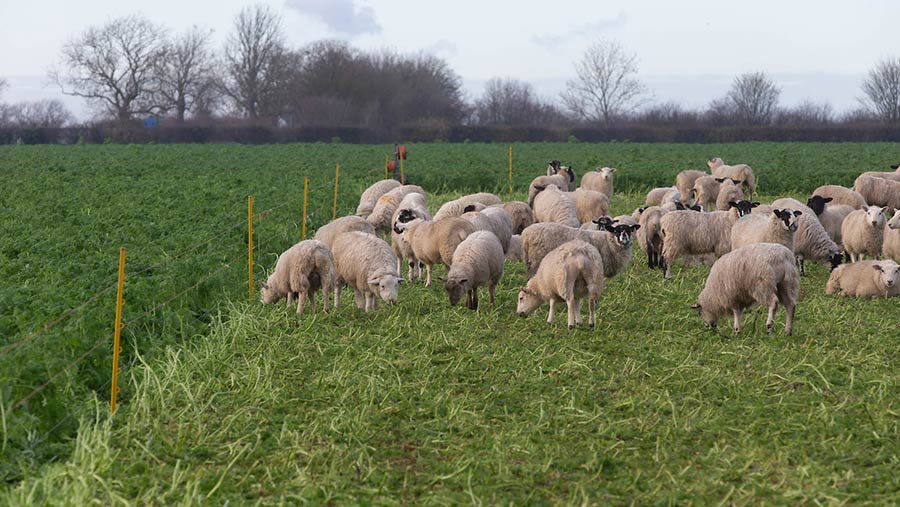Delays to ELM may push farmers to intensive production
 © Tim Scrivener
© Tim Scrivener Government delays to the rollout of Environmental Land Management (ELM) schemes is causing anxiety among farmers ready to embrace the new policy.
English farmers are still waiting for Defra to provide further detail on ELM, which phases out the old CAP system of direct payments in favour of paying farmers “public money for public goods”, such as improved soil health, better water quality and measures to reduce flooding.
Defra has set an ambitious target of signing up 70% of farms in England to ELM by the end of the transition period in 2028.
The Sustainable Farming Incentive (SFI), the first of three components of ELM, is now open for applications.
See also: Food production and nature must go hand in hand, Juniper says
But with a lack of detail forthcoming on the next two components, and further reductions this year in BPS payments of 20-40%, some farmers may find pursuing intensive farming more financially viable than entering ELM.
Farmers and land managers who attended a Natural England conference on Farming for Food and Nature in Birmingham on Monday (28 November) warned Defra that continuing delays to ELM could divert farmers’ attention elsewhere.
Unsurprising observation that the delay in rolling out ELM is leading to farmers rejecting schemes in favour of intensifying production. #foodandnature
— Christopher Price (@RareBreedChris) November 28, 2022
‘Tipping point’
James Hall, a farmer and a chartered surveyor, said farmers were “at a tipping point in this revolution” and many felt it was “like Groundhog Day and conversations we were having a year ago”.
He added: “With change after the [Ukraine] war with the commodity prices, too many farmers I speak to are saying, ‘Well, I’m not going to need this support. I’m going to be a commodity broker and I’m going to farm harder.’
“I think that we are at a really serious tipping point and the decline in our nature could actually accelerate if we don’t get this right very quickly.”
Martin Lines, chairman of the Nature Friendly Farming Network, said farmers were “desperate” for leadership from the government to set a clear direction on how it wants food and nature working together on our landscapes to produce food.
Mark Coulman, national chairman of the Tenant Farmers Association, urged farmers and land managers to look at their farms from both a business and nature perspective and collaborate with each other.
“It’s a once-in-a-lifetime opportunity for tenants and landlords to really come together to make the most of what is available from our key asset, which is land,” he said.
Tenant farmers do not want a set of prescriptions that tell them what they can and can’t talk to their landlord about, but they need a steer from government about the direction of travel it wants the industry to take, he added.
Regen benefits
The conference heard presentations from three farmers – Nic Renison, a livestock farmer based in Penrith, Cumbria, Nick Down, farm manager at the Yattendon estate, near Newbury, west Berkshire, and David Miller, farm manager at the Wheatsheaf Farming Company, in Basingstoke, Hampshire.
They all told how a switch to regenerative farming had enabled their businesses to prosper and had also nature to improve on their farms.
Tony Juniper, chairman of Natural England, kicked off the conference by warning that agriculture will not be profitable in the long term if farmers neglect their duties towards the environment.
“Farm businesses can’t stay in the black for long if nature is in the red,” he noted.
“Farm businesses can’t be in the black if nature is in the red” @TonyJuniper setting the scene at the @NaturalEngland #foodandnature conference. pic.twitter.com/uaRKZLixup
— Geoff Sansome (@HawfordFarm) November 28, 2022
Farmers Weekly understands Defra is expected to set out broad principles for ELM and reaffirm its commitment to the scheme later this week.
Natural England chairman sets out vision for Countryside Stewardship Plus
Natural England chairman Tony Juniper has dismissed recent media speculation the government was about to scrap the second component of ELM (Local Nature Recovery) and that it had lost its appetite for the challenge of joining up food and nature priorities.
“Instead, I am told that the plan is to stick to the already up and running Countryside Stewardship scheme, but to make it much better,” Mr Juniper told delegates.
“At Natural England, we believe that evolving from Countryside Stewardship, as it is now, to the new ELM in a better form, could be a very positive thing if some important changes are made.”
Mr Juniper went on to make five suggestions on Natural England’s vision for how Defra could deliver the scheme, known as “Countryside Stewardship Plus”.
These include:
1. A shift in focus to outcomes rather than a list of defined, detailed and often inflexible prescriptions, with new options to tackle the most urgent problems.
2. A better results-based payments approach that reflects the real value of nature to help tackle some of the issues around the volatility of markets.
3. A rolling application window to allow farmers to apply when it suits them, rather than at a particular time of the year – and an amendment function that means everyone can do more as soon as they are ready.
4. More support for farmer learning with advice available for every farmer to learn new skills and knowledge they need for the future.
5. A food and farming industry-led campaign to get every farmer farming for food and nature, including support for small farms “where people can be overwhelmed by the complexity of the processes.
Mr Juniper said a newly aligned Countryside Stewardship scheme “could thrive if aligned with farmers’ connections to the land, their pride in it and their willingness to do better for nature”.
